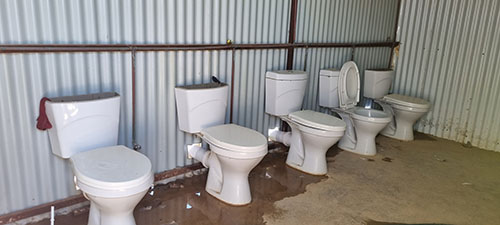Namibian workers employed at the lithium mine owned by Long Fire Investments and Xinfeng Investments are subjected to inhumane living conditions at the mine site while their Chinese colleagues live comfortably.
These shocking disparities were witnessed first-hand by the parliamentary standing committee on natural resources and journalists during a visit to the mine site, about 60 kilometres from Uis, for a public hearing on alleged illegal lithium mining in the Daures constituency. The public hearings followed Landless People’s Movement (LPM) parliamentarian Henny Seibeb’s motion on 6 April, calling for the government to impose a moratorium on lithium mining to determine the real value of the rare earth metal, as well as the legality of operations in the constituency.
As a result, a committee comprising Tjekero Tweya, Kletus Karondo, Maria Elago, Bernardus Swartbooi and Maria Kamutali visited the mine site, where they expressed concern over the living conditions of approximately 130 Namibian workers employed by the company. The Chinese mining company’s licence was abruptly
cancelled earlier this month, causing the company to seek the court’s intervention. The communities in the Daures
constituency, where Xinfeng is active, alleged the company is carrying out illegal lithium mining in Uis, and that their request to stop these activities had fallen on deaf
ears.
A visit to the mine revealed Namibian men are cramped into tiny corrugated rooms, sleeping on bunk beds. Each small room houses four men, leaving little space for movement or personal belongings, and ventilation is a luxury.
“We are happy that you are here. It’s good that you came and saw how we are living,” one of the workers said while guiding the delegation to the bathroom facilities. The workers’ shower room is reminiscent of apartheid-era compounds, with a row of shower heads offering no privacy.
The toilet facilities are similar, as the mineworkers are subjected to sharing the same space with the pots lined up in a row, with no partitions between toilet pots.
The female workers have separate accommodation, but their living conditions are similar to those of their male counterparts. They too face cramped living spaces and inadequate sanitation facilities.
“This is how we live here, and we sometimes cook in our rooms as the power in the kitchen trips the whole electricity. Our facilities are also not cleaned daily, like it’s done in the Chinese accommodation camp,” one worker told the parliamentarians.
In stark contrast, the 25 Chinese workers reside in proper panel rooms, with two individuals sharing each room. These rooms are equipped with air-conditioning, proper kitchen facilities, and bathrooms. The disparity in living conditions did not sit well with the parliamentarians, who expressed disappointment, and described the situation as a form of black-on-black oppression.
“The Chinese places are well taken care of, fitted with well-ventilated systems inside out. Namibians, this is the degenerated situation in which they must work, and the supervisors, who are Namibians themselves, don’t live in the same circumstances.
But it is the workers who produce the wealth who are mistreated,” said concerned parliamentarian Swartbooi.
He further criticised the elites in Namibia for benefiting from the collaboration with the Chinese, while neglecting less fortunate Namibians. He pledged to address the matter, denouncing it as an example of black oppression and foreign involvement in mistreating workers.
During the visit, Likulano Januarie from Long Fire Investments acknowledged that the facilities for Namibian workers were sub-par. He gave the assurance that the company was in the process of addressing the issue, stating, “Yes, we will definitely rectify the issue as our operations are also growing.”
Apart from the living conditions, concerns were raised about the lack of skills transfer at the mine. The Chinese nationals were observed using language translation programmes on their phones during training sessions with Namibian lab assistants.
This drew criticism from Tweya, who emphasised the need for proper skills transfer, and questioned the benefits of training when a language barrier exists.
He urged Namibians to take responsibility and improve the situation, highlighting that this country has always welcomed investors, but skills transfer must be prioritised and adequately established.
“There’s something wrong here. This is not politics; it’s just reality. We are not willing to create opportunities for other Namibians, and they will continue to be spectators, and we will keep justifying it by saying, ‘Let the foreigners just do it for us.’ No, colleagues. Namibians are on their own. You are supposed to protect their interests, to get skills,” stated a concerned Tweya.



